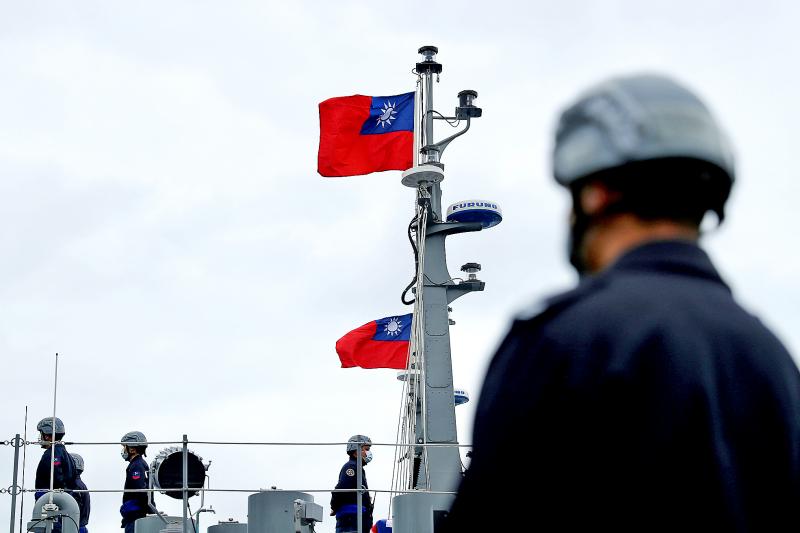The Chinese military would be capable of fighting against Taiwan and allied forces by 2027, a Ministry of National Defense (MND) report said yesterday.
China has set a goal of modernizing its warfare capabilities by that year, which is to mark the 100th anniversary of its army’s founding, and it might by then be able to act more aggressively toward Taiwan, said the report, which the ministry submitted to the Legislative Yuan for review.
The ministry did not cite any evidence that China was planning to invade Taiwan by 2027 or provide any intelligence that Beijing had given up on its vow to achieve “peaceful unification.”

Photo: Ritchie B. Tongo, EPA-EFE
China has over the past few years stationed an increasing number of warships along its southeastern coast, as it is seeking to maintain its military advantage in the region and attempting to build a system of intelligence warfare by 2027, the report said.
By 2027, China is expected to possess regional air defense capabilities, and long-range sea and airstrike systems, which would greatly extend its combat range, following the introduction of its aircraft carriers Liaoning and Shandong, a second-generation Type 003 vessel, as well as the mass production of Type 055 destroyers, Y-20 tanker aircraft and J-20 fighters, the report said.
The ministry said Chinese naval and air forces would be capable of projecting power at greater distances from its territory, extending its reach of military operations and enabling it to counter joint forces between Taiwan and its allies.
Taiwan would respond by improving its defense capabilities in joint operations against an invasion through integrated air defense systems and maritime interception, the report said.
The ministry said it would also focus on armed forces development, including plans for mass production of mature weapons, but did not specify a kind of weapon.
The report said that China is continuing to develop its capabilities to counter the US military in the Indo-Pacific region, which remains an integral part of Washington’s strategic focus, despite Russia’s invasion of Ukraine.
The ministry said there could be an intensified US-China standoff in the region by 2027 over issues including cross-strait relations, tensions on the Korean Peninsula and territorial disputes in the South China Sea, which could increase the risk of conflict between the two countries.
Minister of National Defense Chiu Kuo-cheng (邱國正) last year said that China would be capable of launching a full-scale invasion of Taiwan by 2025, but he did not elaborate on whether it would be able to deal with US involvement in such a war.
Chairman of the US Joint Chiefs of Staff General Mark Milley has since last year reiterated that China aims to develop the capability to invade Taiwan by 2027.
However, he last year also said that although China might want to develop that capability, he sees no near-term intent to do so.

RESILIENCE: Deepening bilateral cooperation would extend the peace sustained over the 45 years since the Taiwan Relations Act, Greene said Taiwan-US relations are built on deep economic ties and shared values, American Institute in Taiwan (AIT) Director Raymond Greene said yesterday, adding that strengthening supply chain security in critical industries, enhancing societal resilience through cooperation and deepening partnerships are key to ensuring peace and stability for Taiwan in the years ahead. Greene made the remarks at the National Security Youth Forum, organized by National Taiwan University’s National Security and Strategy Studies Institution in Taipei. In his address in Mandarin Chinese, Greene said the Taiwan-US relationship is built on deep economic ties and shared interests, and grows stronger through the enduring friendship between

GAINING STEAM: The scheme initially failed to gather much attention, with only 188 cards issued in its first year, but gained popularity amid the COVID-19 pandemic Applications for the Employment Gold Card have increased in the past few years, with the card having been issued to a total of 13,191 people from 101 countries since its introduction in 2018, the National Development Council (NDC) said yesterday. Those who have received the card have included celebrities, such as former NBA star Dwight Howard and Australian-South Korean cheerleader Dahye Lee, the NDC said. The four-in-one Employment Gold Card combines a work permit, resident visa, Alien Resident Certificate (ARC) and re-entry permit. It was first introduced in February 2018 through the Act Governing Recruitment and Employment of Foreign Professionals (外國專業人才延攬及雇用法),

The Ministry of Transportation and Communications yesterday said that it would redesign the written portion of the driver’s license exam to make it more rigorous. “We hope that the exam can assess drivers’ understanding of traffic rules, particularly those who take the driver’s license test for the first time. In the past, drivers only needed to cram a book of test questions to pass the written exam,” Minister of Transportation and Communications Chen Shih-kai (陳世凱) told a news conference at the Taoyuan Motor Vehicle Office. “In the future, they would not be able to pass the test unless they study traffic regulations

EUROPEAN TARGETS: The planned Munich center would support TSMC’s European customers to design high-performance, energy-efficient chips, an executive said Taiwan Semiconductor Manufacturing Co (TSMC, 台積電), the world’s largest contract chipmaker, yesterday said that it plans to launch a new research-and-development (R&D) center in Munich, Germany, next quarter to assist customers with chip design. TSMC Europe president Paul de Bot made the announcement during a technology symposium in Amsterdam on Tuesday, the chipmaker said. The new Munich center would be the firm’s first chip designing center in Europe, it said. The chipmaker has set up a major R&D center at its base of operations in Hsinchu and plans to create a new one in the US to provide services for major US customers,